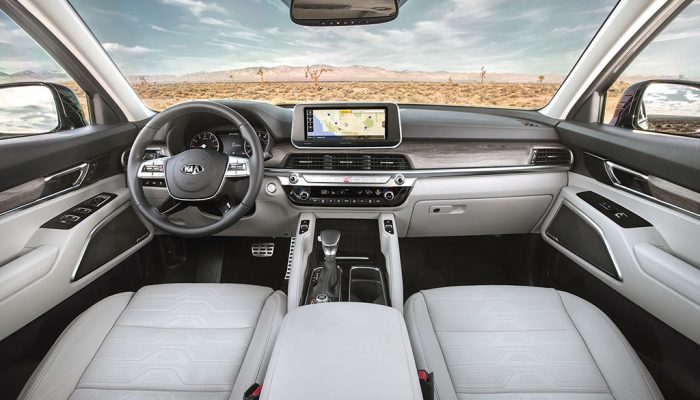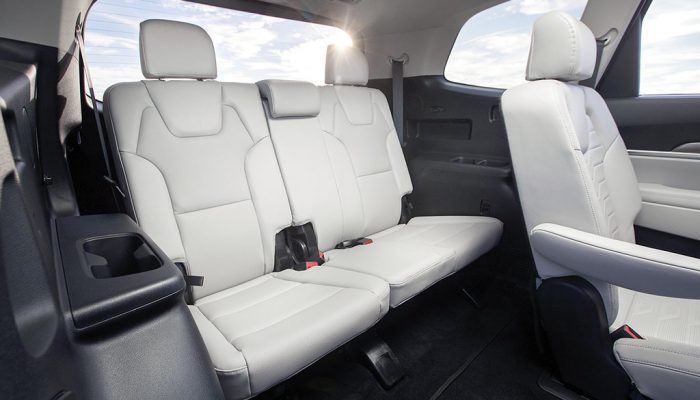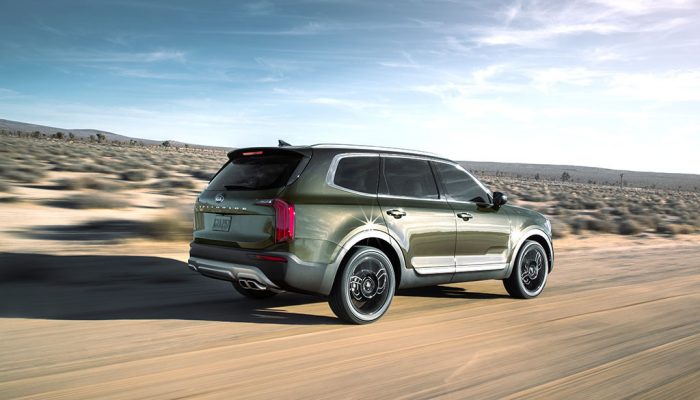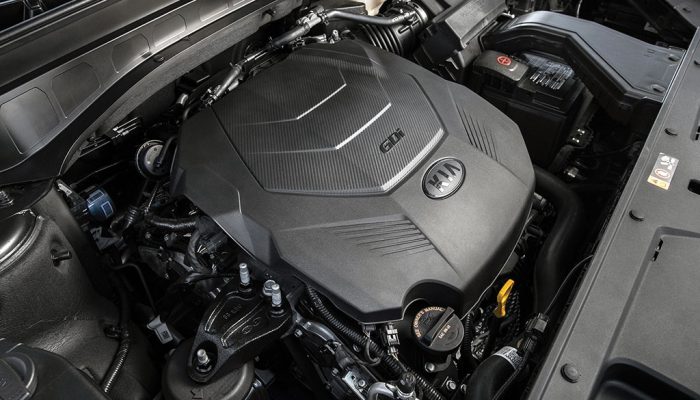By MALCOLM GUNN
www.wheelbasemedia.com
The town of Telluride, Colo., is home to one of North America’s top ski resorts. The newest Kia vehicle, which borrows the Telluride name, is tops among the brand’s lineup for passenger and cargo capacity. In recent years, a number of big and stout utility models — with three rows of seats — have swelled the ranks of the existing people carriers and trailer towers. These newbies include the Volkswagen Atlas, Subaru Ascent, Lincoln Aviator and Hyundai Palisade. Whether it’s due to increased family sizes and/or the need for greater stowage and towing capacity needs, it’s clear the big-uns are riding a popularity wave that has yet to crest.
The Telluride’s fulsome dimensions completely outsize Kia’s next largest seven-passenger vehicle, the Sorento, being 20 centimetres longer, 10 centimetres wider and having close to 13 more centimetres between the front and rear wheels. The Telluride’s extra two centimetres of ground clearance give it more breathing room for travelling rough and rutted roads. The size allows for up to eight occupants to sit comfortably aboard, but one less in the middle row when the optional bucket seats replace the bench.
The Telluride’s cargo capacity matches most competitors, and the tow rating of 2,770 kilograms is also in line with the rest of the pack. Commensurate with its stated intent, the California-styled (and Georgia-built) Telluride projects a rugged, no-nonsense image. From “tiger-nose” grille to tail, the broad-shouldered shape has nary a hint of excess flab or misshapen sheetmetal. Access to the standard third row is relatively easy, with extra-wide rear doors plus second-row seating that folds forward. Overall, the Telluride is an object lesson in design restraint that sets it apart from key competitors such as the Chevrolet Traverse, Volkswagen Atlas and Honda Pilot.
The interior design and fittings also eschews any hint of superfluous excess, yet it’s far from austere. The dashboard is elegantly turned out, including the standard 25.5-centimetre touch screen that’s perched above the air vents. In back, both rows of seats fold nearly flat and the load floor lifts to reveal a generously sized hidden stowage compartment. Getting the Telluride in motion is the job of a 3.8-litre V-6 that puts out 291 horsepower and 262 pound-feet of peak torque. It’s connected to an eight-speed automatic transmission and standard all-wheel-drive.
The system puts 100 per cent of the torque to the front wheels in Eco or Smart modes, while Comfort and Snow modes split it 80:20 front to rear. For more aggressive driving, the Sport-mode split is 65:35. In Lock mode, the torque is split equally to all four wheels and the system’s Downhill Brake Control can also be engaged to keep the Telluride moving at a controlled (slow) rate. Fuel economy is rated at 12.5 l/100 km in the city, 9.6 on the highway and 11.2, combined. Those numbers are essentially identical to the Sorento with the optional V-6 (the base four-cylinder fairs somewhat better).
The base EX model lists for $47,000, including destination charges. This gets you plenty of upscale features and a navigation system, plus active-safety technology, such as automatic emergency braking and active cruise control. The SX trim adds a dual sunroof, leather seat covers, six-way power passenger’s seat, premium 12-speaker Harmon Kardon audio and 20-inch wheels (18s are standard). The SX Limited comes with a self-leveling rear suspension, head-up driver-information display, Nappa leather seat coverings (heated and ventilated front and second rows) and rain-sensing wipers. The second-row high-back bucket seats come only with the SX Limited model. With size, comfort and power in its favor, the Telluride checks off the boxes that most buyers of full-size utility vehicles are looking to fill.
Welcome aboard.
What you should know: 2020 Kia Telluride
Type: Four-door, all-wheel-drive full-size utility vehicle
Engine (h.p.): 3.8-litre DOHC V-6 (291)
Transmission: Eight-speed automatic
Market position: Kia is following parent Hyundai’s lead in filling all the obvious gaps in its utility-vehicle lineup. The full-size Telluride takes on similar offerings from nearly every mainstream automaker.
Points: Styling is straightforward and projects a sense of ruggedness. • The well-appointed base model exudes an upscale feel; other trims even more so. • Standard V-6 engine is more than enough to keep the 1,935-kilogram vehicle on the move. • When can buyers expect a hybrid? • A premium look and feel without a premium price tag.
Active safety:Blind-spot warning with cross-traffic backup alert (std.); active cruise control (std.); emergency braking (std.); drowsy driver alert (std); pedestrian detection (std.) L/100 km (city/hwy) 12.5/9.6; Base price (incl. destination) $47,000.

The dash layout has soft, elegant shapes and gradually shifting lines.
It definitely has a luxury feel, regardless of trim level.

Aiding rear-seat access are wide rear doors and a second row that slides forward.
The smaller Kia Sorento also has a third-row seat, but that vehicle is 20 centimetres shorter and
10 centimetres narrower than the Telluride. PHOTO: KIA

The 291-horsepower 3.8-litre V-6 is a bit odd in a class teeming with smaller turbocharged powerplants.
For whatever the V-6 might give away in fuel economy, it surely makes up for in smooth power delivery.
PHOTO: KIA

The Telluride has a delightfully normal shape, save for the hockey-stick shaped taillights and tiny stacked
headlights with the orange rings. All-wheel-drive is standard. PHOTO KIA
B Y C O M P A R I S O N
Volkswagen Atlas AWD
Base price: $51,800
Value-driven large-size VW model has a 376-h.p. V-6 for all-wheel-drive versions.
Chevrolet Traverse AWD
Base price: $40,900
Roomy and affordable. 301-h.p. V-6 is standard; turbo four-cylinder is optional.
Honda Pilot
Base price: $43,100
Well-regarded utility vehicle has AWD plus a smooth 280-h.p. V-6 is standard.






